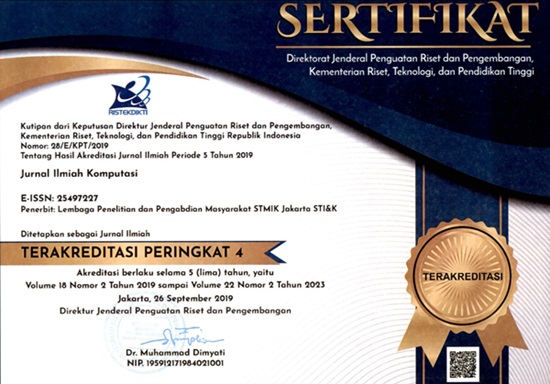Pengelolaan Smart EV Charging Station Melalui Protokol OCPP 2.0 dan OCPI
 :
:
https://doi.org/10.32409/jikstik.24.2.3796
Keywords:
Open Charge Point Protocol 2.0, Open Charge Point Interface, Stasiun Pengisian Mobil Listrik, Smart EV Charging Station, Integrasi ProtokolAbstract
Pengelolaan stasiun pengisian mobil listrik pintar (Smart EV Charging Station) menjadi aspek penting dalam mendukung percepatan adopsi kendaraan listrik secara global. Penelitian ini bertujuan mengkaji integrasi protokol OCPP 2.0 (Open Charge Point Protocol) dan OCPI (Open Charge Point Interface) untuk meningkatkan efisiensi pengelolaan dan interoperabilitas stasiun pengisian. Metode yang digunakan mencakup studi literatur dan simulasi operasional stasiun berbasis protokol. Hasil penelitian menunjukkan bahwa OCPP 2.0 mengontrol proses pengisian secara lokal dengan optimal, sedangkan OCPI memperluas konektivitas lintas jaringan, sehingga pengguna dapat mengakses berbagai stasiun dengan satu protokol standar. Integrasi ini meningkatkan efisiensi operasional, mengurangi biaya infrastruktur, dan mendukung keberlanjutan ekosistem kendaraan listrik. Kesimpulannya, sinergi kedua protokol memperkuat infrastruktur pengisian saat ini dan membangun dasar yang kokoh untuk pengembangan kendaraan listrik di masa depan.
Downloads
References
A. U. Din, J. Ming, A. Vega-Muñoz, G. Salazar Sepúlveda, and N. Contreras-Barraza, “Population Density: An Underlying Mechanism Between Road Transportation and Environmental Quality,” Front. Environ. Sci., vol. 10, no. June, pp. 1–12, 2022, doi: 10.3389/fenvs.2022.940911.
B. D. Purnamasari, T. A. A. Jamaluddin, H. Halidah, and F. Armansyah, “Cost and benefit battery swapping business model for indonesian electric two-wheeler,” IOP Conf. Ser. Earth Environ. Sci., vol. 1108, no. 1, 2022, doi: 10.1088/1755-1315/1108/1/012010.
T. Jonas, N. Daniels, and G. Macht, “Electric Vehicle User Behavior: An Analysis of Charging Station Utilization in Canada,” Energies, vol. 16, no. 4, pp. 1–19, 2023, doi: 10.3390/en16041592.
F. Schulz and J. Rode, “Public charging infrastructure and electric vehicles in Norway,” Energy Policy, vol. 160, p. 112660, 2022, doi: https://doi.org/10.1016/j.enpol.2021.112660.
S. Yan, M. H. Shah, J. Li, N. O’Connor, and M. Liu, “A Review on AI Algorithms for Energy,” 2023.
Y. Qiao, K. Huang, J. Jeub, J. Qian, and Y. Song, “Deploying electric vehicle charging stations considering time cost and existing infrastructure,” Energies, vol. 11, no. 9, 2018, doi: 10.3390/en11092436.
G. Falchetta and M. Noussan, “Electric vehicle charging network in Europe: An accessibility and deployment trends analysis,” Transp. Res. Part D Transp. Environ., vol. 94, no. April, 2021, doi: 10.1016/j.trd.2021.102813.
Z. Garofalaki, D. Kosmanos, S. Moschoyiannis, D. Kallergis, and C. Douligeris, “Electric Vehicle Charging: A Survey on the Security Issues and Challenges of the Open Charge Point Protocol (OCPP),” IEEE Commun. Surv. Tutorials, vol. 24, no. 3, pp. 1504–1533, 2022, doi: 10.1109/COMST.2022.3184448.
M. S. Roni, Z. Yi, and J. G. Smart, “Optimal charging management and infrastructure planning for free-floating shared electric vehicles,” Transp. Res. Part D Transp. Environ., vol. 76, pp. 155–175, 2019, doi: https://doi.org/10.1016/j.trd.2019.09.021.
P. Pao-la-or and B. Boribun, “Modeling and analysis of the plug-in electric vehicles charging in the unbalanced radial distribution system,” Int. J. Electr. Electron. Eng. Telecommun., vol. 8, no. 3, pp. 133–138, 2019, doi: 10.18178/ijeetc.8.3.133-138.
L. Xue, “Challenges and Solutions in Electric Vehicle Charging Infrastructure,” J. Power Sources, vol. 478, pp. 229–245, 2021.
Y. Zhang, “Interoperability Issues in Electric Vehicle Charging: A Comparative Analysis of OCPP 1.6 and OCPP 2.0,” IEEE Trans. Smart Grid, pp. 3448–3459, 2020.
C. Dalamagkas, V. D. Melissianos, G. Papadakis, A. Georgakis, V.-M. Nikiforidis, and K. Hrissagis-Chrysagis, “The Open V2X Management Platform: An intelligent charging station management system,” Inf. Syst., vol. 129, p. 102494, 2025, doi: https://doi.org/10.1016/j.is.2024.102494.
A. S. Al-Ogaili et al., “Review on Scheduling, Clustering, and Forecasting Strategies for Controlling Electric Vehicle Charging: Challenges and Recommendations,” IEEE Access, vol. 7, pp. 128353–128371, 2019, doi: 10.1109/ACCESS.2019.2939595.
F. Mandrile, D. Cittanti, V. Mallemaci, and R. Bojoi, “Electric vehicle ultra-fast battery chargers: A boost for power system stability?,” World Electr. Veh. J., vol. 12, no. 1, pp. 1–21, 2021, doi: 10.3390/wevj12010016.
B. Walzel, M. Hirz, H. Brunner, and N. Kreutzer, “Robot-Based Fast Charging of Electric Vehicles,” SAE Tech. Pap., p. 14, 2019, doi: https://doi.org/10.4271/2019-01-0869.
N. Ahn, S. Y. Jo, and S. J. Kang, “Constraint-aware electricity consumption estimation for prevention of overload by electric vehicle charging station,” Energies, vol. 12, no. 6, 2019, doi: 10.3390/en12061000.
O. Heilmann et al., “Driving Profiles of Light Commercial Vehicles of Craftsmen and the Potential of Battery Electric Vehicles When Charging on Company Premises,” World Electr. Veh. J., vol. 15, no. 5, 2024, doi: 10.3390/wevj15050211.
F. Tuchnitz, N. Ebell, J. Schlund, and M. Pruckner, “Development and Evaluation of a Smart Charging Strategy for an Electric Vehicle Fleet Based on Reinforcement Learning,” Appl. Energy, vol. 285, p. 116382, 2021, doi: https://doi.org/10.1016/j.apenergy.2020.116382.
R. Carli and M. Dotoli, “A Distributed Control Algorithm for Optimal Charging of Electric Vehicle Fleets with Congestion Management,” IFAC-PapersOnLine, vol. 51, no. 9, pp. 373–378, 2018, doi: 10.1016/j.ifacol.2018.07.061.
K. Harouri, S. Hani, F. Aissaoui, M. Benbouzid, and H. Mediouni, “Electric Vehicle Charging Station: A Review of Energy Management Systems and Control Type,” Int. J. Energy Convers., vol. 9, pp. 251–266, Nov. 2021, doi: 10.15866/irecon.v9i6.21506.
S. Hsaini, M. Ghogho, and M. E. H. Charaf, “An OCPP-Based Approach for Electric Vehicle Charging Management,” Energies, vol. 15, no. 18, pp. 1–14, 2022, doi: 10.3390/en15186735.
S. R. Kirchner, “OCPP Interoperability: A Unified Future of Charging,” World Electr. Veh. J., vol. 15, no. 5, 2024, doi: 10.3390/wevj15050191.
A. Golder and S. S. Williamson, “Energy Management Systems for Electric Vehicle Charging Stations: A Review,” in IECON 2022 – 48th Annual Conference of the IEEE Industrial Electronics Society, 2022, pp. 1–6. doi: 10.1109/IECON49645.2022.9968614.
S. Orcioni, L. Buccolini, A. Ricci, and M. Conti, Electric Vehicles Charging Reservation Based on OCPP. 2018. doi: 10.1109/EEEIC.2018.8494366.
H. Lin, Y. Zhou, Y. Li, and H. Zheng, “Aggregator pricing and electric vehicles charging strategy based on a two-layer deep learning model,” Electr. Power Syst. Res., vol. 227, p. 109971, 2024, doi: https://doi.org/10.1016/j.epsr.2023.109971.
T. Morstyn, A. Teytelboym, and M. D. McCulloch, “Matching Markets with Contracts for Electric Vehicle Smart Charging,” in 2018 IEEE Power & Energy Society General Meeting (PESGM), 2018, pp. 1–5. doi: 10.1109/PESGM.2018.8586361.
B. V. Malozyomov, N. V. Martyushev, S. N. Sorokova, E. A. Efremenkov, D. V. Valuev, and M. Qi, “Mathematical Modelling of Traction Equipment Parameters of Electric Cargo Trucks,” Mathematics, vol. 12, no. 4, 2024, doi: 10.3390/math12040577.
N. Andrenacci, G. Giuli, A. Genovese, and G. Pede, “Flexible Charging to Energy Saving—Strategies Assessment with Big Data Analysis for PHEVs Private Cars,” World Electr. Veh. J., vol. 15, no. 5, 2024, doi: 10.3390/wevj15050197.
J. Liu, T. Zhang, J. Zhu, and T. Ma, “Allocation optimization of electric vehicle charging station (EVCS) considering with charging satisfaction and distributed renewables integration,” Energy, vol. 164, pp. 560–574, 2018, doi: https://doi.org/10.1016/j.energy.2018.09.028.
M. Hardinghaus, J. E. Anderson, C. Nobis, K. Stark, and G. Vladova, “Booking Public Charging: User Preferences and Behavior towards Public Charging Infrastructure with a Reservation Option,” Electron., vol. 11, no. 16, pp. 1–19, 2022, doi: 10.3390/electronics11162476.
M. G. Quílez, M. Abdel-Monem, M. El Baghdadi, Y. Yang, J. Van Mierlo, and O. Hegazy, “Modelling, analysis and performance evaluation of power conversion unit in G2V/V2G application-a review,” Energies, vol. 11, no. 5, 2018, doi: 10.3390/en11051082.
A. Pristovnik and B. Cvetič, “OCPP Protocol Explained (OCPP 1.6 and OCPP 2.0.1),” tridenstechnology.com. Accessed: Jan. 07, 2025. [Online]. Available: https://tridenstechnology.com/ocpp-protocol/
C. Yang, J. C. Tu, and Q. Jiang, “The influential factors of consumers- sustainable consumption: A case on electric vehicles in China,” Sustain., vol. 12, no. 8, 2020, doi: 10.3390/SU12083496.
Chargelab, “What is OCPI,” chargelab.co. Accessed: Jan. 07, 2025. [Online]. Available: https://chargelab.co/industry-advocacy/ocpi
A. Ramachandran, A. Balakrishna, P. Kundzicz, and A. Neti, “Predicting Electric Vehicle Charging Station Usage,” 2018.
Downloads
Published
How to Cite
Issue
Section
Categories
 Abstract View: 0 times
Abstract View: 0 times








